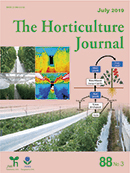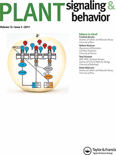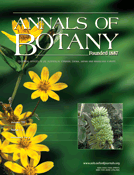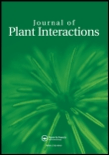
PHOTOSYNTHETICA
Scope & Guideline
Advancing plant science through innovative research.
Introduction
Aims and Scopes
- Photosynthetic Mechanisms and Efficiency:
Research on the fundamental mechanisms of photosynthesis, including the efficiency of photosystems and the role of chlorophyll fluorescence in assessing photosynthetic performance. - Plant Responses to Abiotic Stress:
Investigation of how plants adapt their photosynthetic processes in response to abiotic stresses such as drought, salinity, temperature fluctuations, and nutrient deficiencies. - Molecular and Physiological Adaptations:
Studies aimed at understanding the molecular basis of physiological responses in plants, including gene expression related to photosynthesis and the role of phytohormones in stress responses. - Innovative Techniques in Photosynthesis Research:
Application of advanced methodologies, such as imaging techniques and chlorophyll fluorescence measurements, to explore photosynthetic activities at cellular and whole-plant levels. - Ecophysiology and Environmental Interactions:
Examination of photosynthetic performance in relation to environmental factors, including light quality, water availability, and nutrient dynamics in diverse ecosystems.
Trending and Emerging
- Stress Physiology and Resilience Mechanisms:
An increasing number of studies are dedicated to understanding how plants cope with environmental stressors, highlighting adaptive mechanisms that enhance photosynthetic efficiency under challenging conditions. - Biotechnological Applications and Genetic Engineering:
Research exploring genetic modifications and biotechnological approaches to enhance photosynthesis and stress tolerance in crops is gaining traction, reflecting a push towards sustainable agricultural practices. - Role of Secondary Metabolites in Photosynthesis:
There is a growing interest in how secondary metabolites, such as antioxidants, influence photosynthetic performance and stress responses, indicating a more integrated approach to studying plant physiology. - Climate Change Impact Studies:
Research assessing the effects of climate change on photosynthesis, including shifts in species distribution and adaptations of photosynthetic processes, is increasingly prominent, reflecting global environmental concerns. - Interdisciplinary Approaches Combining Physiology and Technology:
The integration of advanced technologies, such as IoT and imaging techniques, to monitor and optimize photosynthetic activity is emerging as a significant trend, demonstrating the relevance of interdisciplinary research in the field.
Declining or Waning
- Traditional Crop Photosynthesis Studies:
Research specifically focused on traditional crops and their photosynthetic mechanisms has decreased, possibly due to the rise of interest in more diverse and stress-tolerant plant species. - Basic Plant Morphology in Photosynthesis:
Studies that primarily explore basic morphological characteristics of plants in relation to photosynthesis without addressing physiological or molecular implications are becoming less common. - Focus on Non-Photosynthetic Organisms:
There has been a noticeable reduction in research pertaining to the photosynthetic capabilities of non-vascular or non-traditional photosynthetic organisms, such as certain algae, reflecting a shift towards vascular plant studies.
Similar Journals

PROTOPLASMA
Transforming Research into Knowledge for Future GenerationsPROTOPLASMA is a prestigious academic journal published by Springer Wien, dedicated to advancing knowledge in the fields of Cell Biology, Plant Science, and related areas of Medicine. Established in 1926 and continuing through 2024, this journal boasts a rich history of scholarly contributions and is currently indexed with a notable ranking in various disciplines: it stands in the top quartile (Q1) in Plant Science, the second quartile (Q2) in miscellaneous Medicine, and the third quartile (Q3) in Cell Biology as of 2023. With robust Scopus rankings placing it in the 86th percentile in Plant Science and a solid position in Cell Biology, PROTOPLASMA is recognized for its commitment to high-quality research and innovative findings. Although the journal does not offer open access options, it remains a valuable resource for researchers, professionals, and students seeking to explore the cellular and molecular underpinnings of plant life and its implications in broader biological contexts. Based in Austria, PROTOPLASMA serves as a vital forum for disseminating pioneering research that shapes the future of scientific inquiry in its respective fields.

Horticulture Journal
Exploring the Science of Plant CultivationThe Horticulture Journal, published by the Japan Society for Horticultural Science, is a leading academic platform dedicated to the advancement of horticultural research and practices. With an ISSN of 2189-0102 and an E-ISSN of 2189-0110, this journal endeavors to publish high-quality research that emphasizes innovative techniques, sustainable practices, and the science of plant cultivation. The journal has been recognized for its impact within the field, currently holding a Q2 ranking in Horticulture and a Q3 ranking in Plant Science as of 2023, indicating its significant contribution to advancing knowledge. With its open-access model, researchers, professionals, and students have the opportunity to engage with the latest findings, thanks to the journal's commitment to widespread dissemination of information. Since its convergence period began in 2015 and continuing through to 2024, the Horticulture Journal remains instrumental in promoting sustainable and beneficial practices in horticulture science globally.

JOURNAL OF PLANT GROWTH REGULATION
Fostering Global Insights in Plant Growth DynamicsJOURNAL OF PLANT GROWTH REGULATION, published by SPRINGER, is a prestigious academic journal that has been at the forefront of advancing research in Agronomy and Plant Science since its inception in 1982. With an impressive impact factor and a 2023 Scopus ranking placing it in the Q1 category for both agronomy and crop science as well as plant science, this journal attracts a global audience of researchers, professionals, and students dedicated to understanding the complexities of plant growth and regulation. The journal covers a diverse range of topics relevant to plant physiology, biochemistry, and the environmental factors affecting plant development, thus providing a critical platform for sharing significant discoveries and insights within the agricultural and biological sciences. Researchers can access the journal through traditional subscriptions, ensuring a broad dissemination of high-quality research output. As it continues to shape the field into 2024 and beyond, JOURNAL OF PLANT GROWTH REGULATION remains an essential resource for anyone involved in plant science research and innovation.

Plant Signaling & Behavior
Revolutionizing Understanding of Plant InteractionsPlant Signaling & Behavior is a prestigious journal published by TAYLOR & FRANCIS INC, dedicated to advancing the understanding of the complex signaling mechanisms and behavioral responses of plants. With an ISSN of 1559-2316 and an E-ISSN of 1559-2324, it has firmly established itself in the field of Plant Science, earning a Q1 ranking in the 2023 category quartiles and ranking #83 out of 516 in Agricultural and Biological Sciences, placing it in the 84th percentile according to Scopus metrics. The journal serves as a vital platform for researchers and professionals looking to publish innovative studies and reviews that explore the intricate relationships between plant behavior and environmental signaling. With coverage spanning from 2006 to 2024, Plant Signaling & Behavior not only enhances academic discourse but also supports the growing interdisciplinary nature of plant sciences. Although the journal is not open access, it remains a significant resource for students, researchers, and practitioners aiming to deepen their understanding of plant signaling and its implications for ecology and agricultural practices.

JOURNAL OF PLANT RESEARCH
Advancing Sustainable Practices Through Plant Research.JOURNAL OF PLANT RESEARCH, published by SPRINGER JAPAN KK, is a leading academic journal that has carved a niche in the field of Plant Science. With its ISSN 0918-9440 and E-ISSN 1618-0860, this journal has been disseminating high-quality research since its inception in 1993 and continues to be essential reading for academics and practitioners alike, aiming to bridge the gap between innovative plant research and practical applications. The journal is highly regarded, holding a prestigious Q1 ranking in Plant Science for 2023, and is positioned in the top 80th percentile within the Scopus rankings for Agricultural and Biological Sciences. The journal's coverage includes a wealth of topics pertinent to advancing our understanding of plant biology, ecology, and sustainable agricultural practices. Although it operates under a subscription model, its influence in the research community remains profound, making it a vital resource for contemporary studies in plant-related disciplines.

Plant Stress
Exploring the Resilience of Flora Under StressPlant Stress is a prestigious academic journal published by Elsevier that focuses on the critical study of stress responses in plants, bridging vital areas such as ecology, evolution, and plant science. With its ISSN 2667-064X, this journal serves as an essential platform for researchers and professionals seeking to explore innovative findings and advancements in plant stress biology. Its notable rankings in the Q1 category for both Ecology, Evolution, Behavior, and Systematics and Plant Science as of 2023 further establish its significance, being recognized in the top quartile of its field. The journal’s impressive Scopus ranks, including Rank #144/721 and Rank #107/516 in the respective categories, highlight its influence and the quality of research it disseminates. While currently not offering Open Access, Plant Stress is instrumental in fostering academic dialogue and collaboration among researchers worldwide, with implications that extend beyond theoretical studies into practical applications in agriculture and environmental management. For those dedicated to understanding plant resilience and stress adaptation, Plant Stress is an indispensable resource.

ANNALS OF BOTANY
Leading the Way in Botanical Research and DiscoveryANNALS OF BOTANY, published by Oxford University Press, stands as a leading journal in the field of Plant Science, with a distinguished history that dates back to 1887. This esteemed journal, recognized for its contribution to the advancement of botanical research, holds a prestigious Q1 quartile ranking in its category as of 2023. With a commitment to sharing high-quality, peer-reviewed research, ANNALS OF BOTANY provides a vital platform for researchers, professionals, and students to disseminate novel findings and engage in scholarly discourse. Although it does not currently offer open access options, the journal remains accessible to a wide academic audience, further cementing its role in facilitating the exchange of knowledge within the global botanical community. For those interested in the dynamic and evolving world of plant sciences, ANNALS OF BOTANY is an indispensable resource.

ACTA PHYSIOLOGIAE PLANTARUM
Cultivating knowledge in agronomy and crop science.ACTA PHYSIOLOGIAE PLANTARUM, published by Springer Heidelberg, is a leading journal dedicated to advancing the fields of Agronomy, Plant Science, and Physiology. With an ISSN of 0137-5881 and an E-ISSN of 1861-1664, this esteemed publication has a significant global outreach, being based in Germany. The journal is recognized for its impactful contributions, currently holding a Q2 ranking in both Agronomy and Crop Science, as well as Plant Science, and a Q3 ranking in Physiology according to 2023 category quartiles. Its Scopus rankings reflect its reputable standing within the academic community, with notable placements in Agricultural and Biological Sciences, further highlighting its importance for researchers and professionals in the field. The objective of ACTA PHYSIOLOGIAE PLANTARUM is to foster robust discussions and disseminate innovative studies that enhance our understanding of plant physiology and its applications. Though not an open-access journal, it provides comprehensive access options for readers keen on exploring cutting-edge research that drives advancements in agricultural productivity and sustainability. Through its dedication to excellence, this journal continues to be a vital resource for advancing knowledge and practices in plant sciences.

Frontiers in Plant Science
Exploring innovative solutions for a greener tomorrow.Frontiers in Plant Science is a premier open-access journal dedicated to advancing the understanding of plant biology, covering a broad spectrum of topics including physiology, ecology, and biotechnology. Published by FRONTIERS MEDIA SA in Switzerland, this journal has established itself as a key resource in the field of plant science, boasting an impressive impact factor and ranking in the Q1 category for plant science as of 2023. With its Scopus rank of 61 out of 516 in both Agricultural and Biological Sciences, the journal is recognized for its quality and relevance, being in the 88th percentile among its peers. Since its inception in 2010, Frontiers in Plant Science has embraced an open-access format, ensuring that cutting-edge research is readily available to scientists, professionals, and educators around the globe. The journal aims to foster innovative research and collaboration within the plant science community, making it an essential publication for those looking to stay at the forefront of the discipline.

Journal of Plant Interactions
Exploring Ecological Connections Through PlantsThe Journal of Plant Interactions, published by Taylor & Francis Ltd in the United Kingdom, serves as a leading open-access platform dedicated to advancing the understanding of plant interactions and their ecological implications. Established in 2005 and transitioning to open access in 2015, this journal focuses on both fundamental and applied aspects of plant interactions, providing invaluable insights for researchers, professionals, and students within the fields of Ecology and Plant Science. With a commendable impact factor and ranked in the second quartile (Q2) for both Ecology, Evolution, Behavior and Systematics and Plant Science, it reflects the quality and relevance of its published research. Researchers aiming to publish innovative studies on plant behavior and ecosystem dynamics will find a welcoming avenue for their work, as the journal is dedicated to fostering open dialogue and sharing knowledge across disciplines.